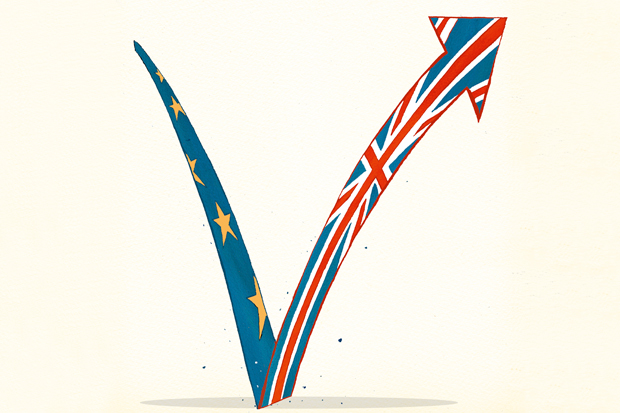No group of the population voted to remain in the EU more enthusiastically than students. According to the polling organisation YouthSight, 85 per cent of them voted to remain, and among the 15 per cent who voted leave, 17 per cent say they now regret it. Moreover, the idea that students were too lazy or drunk to turn out to vote is a gross calumny on the young, according to the survey. It found that 87 per cent of eligible students turned out to vote — compared with 72 per cent of the general population.
What it didn’t reveal is how many students voted more than once. My biggest shock of referendum day — apart from the result itself — was my undergraduate son producing the three polling cards he had accidentally acquired as a result of living in three different student residences. So desperate was the government to increase turnout among the young that it seemed to overlook the problem of people being sent multiple cards. My son only used one, but would anyone have checked had he used three? I wouldn’t be surprised if this was the first election where the student turnout actually nudged over 100 per cent.
No matter, students didn’t get the result they wanted, leading to a huge sense of grievance. In my day students used to plaster their rooms with that poster of Che Guevara. Now, to judge by the outrage, they must have pin-ups of Jean-Claude Juncker.
If you are a student or a sixth-former contemplating university education, and are spitting brass tacks at the vote for Brexit, you might just be overestimating its effect on your life. One of the main concerns has been the future of the Erasmus programme — an EU scheme set up in 1987 to help students study in other European countries. In 2012/13 it helped 268,000 students in this way, with the aid of grants paid from its €3.1 billion budget. Erasmus’s UK director recently questioned whether Britain would remain in the scheme, saying, ‘We face a sad moment of uncertainty, after 30 years of this enrichment of so many lives.’
But then the Erasmus Programme doesn’t just cover EU countries. It also extends to Norway, Iceland, Switzerland and Turkey. If countries which have never been part of the EU can take part, why should a former EU member be kicked out?
Of more relevance to wandering students in many ways is the European Higher Education Area (EHEA), which seeks to harmonise university-courses — facilitating student exchanges if not providing grants to fund them. But then the EHEA has little to do with the EU. It was mooted at a meeting in Bologna in 1998 between France, Germany, Britain and Italy and has since grown to 47 members, including Russia, Armenia and Kazakhstan — not noted members of the EU.
The other international body whose future has caused unquiet on the campuses is the European Research Council (ERC), which funds research (with our own money, needless to say). This is an EU body, yet it is one which also extends to non-EU Norway, Turkey, Iceland and Switzerland. If Turkey, which is not even in the single market, can be a member, there seems little reason to think that a post-EU Britain wouldn’t be able to remain a member too.
What is likely to change following Brexit is the rules regarding tuition fees across EU borders. At the moment, EU law forbids students from other EU states being offered a different deal to that which is available to home students. As a result, undergraduates from other EU states studying at English universities can be charged no more than £9,000 a year in tuition fees. Those at Scottish universities cannot be charged at all — although a bizarre anomaly means that students from elsewhere within the UK must pay, which makes no sense at all.
Presumably, come Brexit, EU nationals studying in England will pay the same as other international students — currently, an average of £11,987 for-lecture-based subjects, rising to £24,206 for clinical subjects. Some universities, such as UCL, have said they won’t charge EU students extra — but that is an offer unlikely to be upheld for long, since universities are always bleating that £9,000 isn’t enough to fund their courses. What Brexit will do is allow more international students to be charged fees which cover the full cost of their courses, reducing pressure on the government to raise fees for home students.
Those who do stand to lose out are English students who have sought out degree courses in other EU countries as a cheaper alternative to studying in Britain. In the Netherlands, where some universities offer courses taught in English, EU nationals pay a standard fee of €1,984. After Brexit, they could find themselves paying upwards of €5,000.
Yet there are still some countries where you will be able to save money. Norwegian universities, for example, don’t charge tuition fees to students from home or abroad. France, where tuition fees begin at around €200 a year, treats international students just as it does its own. And in Germany, there are no fees for ordinary undergraduate degrees. So if you are still sulking after Brexit, all is not lost. How about signing up for a masters in European Union Studies at the University of Bonn?
The post Out but not down appeared first on The Spectator.
Got something to add? Join the discussion and comment below.
Get 10 issues for just $10
Subscribe to The Spectator Australia today for the next 10 magazine issues, plus full online access, for just $10.
You might disagree with half of it, but you’ll enjoy reading all of it. Try your first month for free, then just $2 a week for the remainder of your first year.















Comments
Don't miss out
Join the conversation with other Spectator Australia readers. Subscribe to leave a comment.
SUBSCRIBEAlready a subscriber? Log in